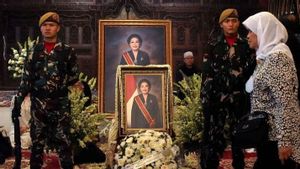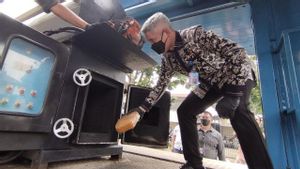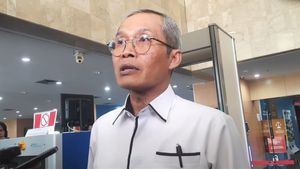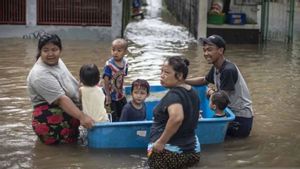
JAKARTA The draft National Education System Law (RUU Sisdiknas) of the August 2022 script continues to reap polemic. The Civil Society Alliance after the Indonesian National Education and Culture Bill asked the Ministry of Education for Research and Technology or related institutions to review it again.
The Sisdiknas Bill, which consists of 16 chapters and 150 articles, must prioritize the goals of national education that have been outlined in the Constitution. As stated in Law Number 20 of 2003 Article 3:
National education functions to develop the ability and shape the character and civilization of a dignified nation in order to educate the nation's life, aiming to develop the potential of students so that they become human beings who believe and fear God Almighty, have noble morals, are healthy, knowledgeable, capable, creative, independent, and become democratic and responsible citizens.
However, the reality is that in the name of industrialization and globalization this bill has reduced the essence of education just as a workforce printer engine. Giving fresh air to the commercialization of education which is a reflection of the penetration of capitalism in the education system.
"As a result, the purpose of education is only to serve industrial interests in the name of increasing human resources," said Tri Noviana as coordinator of the Civil Society Alliance at the Guard of the Indonesian National Education and Culture Bill, in an official statement received by VOI on November 22.
Despite being partially scattered in several articles, the Alliance noted that commercialization found its culmination points in Article 29 paragraph (1) and Article 83 paragraph (4).
Article 29 paragraph (1) reads, The medium education level as referred to in Article 28 is an education designed to deepen a more varied and specific understanding of science and prepare students to: a. Continuing to the High Education Level; and/or. Developing competencies relevant to the business world, industrial world, and the world of work.
"The right to education that should bring release to a human being seems to have lost his spirit due to the reduction of competence which only functions to supply industrial needs," Tri said.
The government with the vision of Merdeka Learning will only stop limited to jargon if education is solely directed at producing labor. The laws and standards held by the market, business world, industry, and the world of work are things that are very different from the laws and essential standards of education.
Indeed independence will never be achieved if education is only a factory for the needs of a very volatile and uncertain market. Education should not be dictated at all by the interests of capital and market," Tri continued.
Likewise in Article 83 paragraph (4), Development and determination of the curriculum and the achievement of Learning as referred to in paragraph (1) to paragraph (3) can involve the community and/or the business world, the industrial world, and the world of work.
Curriculum is a very essential aspect in education. Through the curriculum, educators work in aligning what education wants to achieve with the spirit of independence and the state as stated in the constitution.
If this very important aspect is created and developed by the interests of industry, then the purpose of education has changed by itself. Education is no longer a space for the achievement of the nation's ideals, but is limited to space for the achievement of capital ideals and market interests. In this case, the state has been negligent and relinquished its main responsibility.
"Without intending to carry out simplification, in general the contents of the above script provide us with the view that the compilers seem not to recognize the character and culture of Indonesia as a nation. Therefore, in substance and paradigm it contains very serious defects," said Tri.
In the midst of the heavy currents of globalization and digitalization today what needs to be done is to strengthen the foundation and the national paradigm. The government should not stutter and rush, and not be dictated by outside interests in the name of effectiveness and efficiency.
Economic interests require a workforce as fast as possible and its formation is borne by the very strategic education sector.
"If education is only used as a medium for labor printers, then neocolonialism that has always been echoed by Soekarno is true," added Tri.
Prof. DR. HAR Tilaar in his book "National Education Kaleidoscope" admits that education does not escape the global power that has hit the world today. Some have a big meaning in humanity, but not less which has a negative impact on the development of human culture. This is something to watch out for from the impact of globalization.
"If we are not aware of the negative effects of the globalization wave, we will face the destruction of Indonesian culture that is Bhinneka or national education that is no longer directed at the needs of the people and strengthening Indonesia's identity, but is directed at global competition in the form of internationalizing national education," wrote Prof. Tilaar.
The proof has been clear, since kindergarten, Indonesian children have been fed English lessons in the hope that later children will have a better future because they can compete more easily in the international arena. English mastery is important, but what is very important is to first instill the values of national identity, one language, Indonesian language.
Likewise, at the secondary to university level, it tends to open international classes.
It illustrates that the education system directs students to fight freely in the struggle to become the best nation. In fact, the culture of competition is not the paradigm of education, but the paradigm of the economy.
In the formulation of the goals of national education, it is not said that national education is developed above the competition paradigm. The emphasis is more on educating the nation's life.
An intelligent nation is certainly not a nation that is a slave of another nation. An intelligent nation is a nation that has intellectual abilities that can stand just as upright as other nations in the international arena.
A nation that stands alone, which has its own dignity, is an independent nation, added Prof. Tilaar.
The English, Chinese, Japanese, Arabic, and French versions are automatically generated by the AI. So there may still be inaccuracies in translating, please always see Indonesian as our main language. (system supported by DigitalSiber.id)








